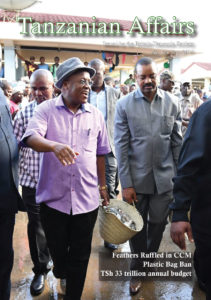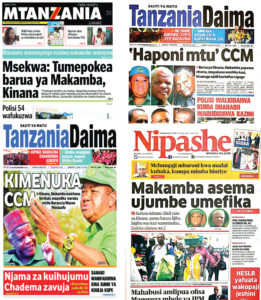by Ben Taylor
Parliament passes TSh 33 trillion annual budget
MPs overwhelmingly endorsed the TSh 33.1 trillion budget for the 2019/2020 Financial Year, a slight increase from 32.4 trillion in 2018/19. All CCM MPs endorsed the budget while the majority of opposition MPs voted against. Government expenditure is expected to reach 22.7% of GDP in 2019/20 estimates, up from 22.3% in 2018/19.
Of this amount, TSh 11.7 trillion is allocated for development projects. The minister said the development plan focuses on attaining 7.1% growth of Gross Domestic Product (GDP) in 2019 compared to 7.0% in 2018. The budget also aims to maintain inflation at between 3% and 4.5% and increase national revenue collection to 13.1% of GDP in the 2019/20 fiscal year from this year’s 12.1%.
According to the Minister, Tanzania cemented its middle-income status last year by raising its per capita Gross Domestic Product (GDP) to $1,090, and noted that a strong year for agriculture had kept inflation down at 3.5%, the lowest level in 40 years.
Dr Mpango said the government seeks to put emphasis on the establishment and development of industries, especially those exploiting domestically produced raw materials. He said the focus will be on development of industrial clusters, Tanzania Automobiles Manufacturing Company Ltd (TAMCO) in Kibaha, Coast region, hide industry in Dodoma and special investment zones in Bunda, Dodoma and Benjamin William Mkapa in Dar es Salaam.
The budget also includes plans to spend TSh 9.7 trillion to service the public debt, which reached over TSh 51 trillion as of April, up from 49.9 trillion a year earlier. The Minister of Finance and Planning, Dr Philip Mpango, assured MPs that the debt remains manageable, according to the recent assessment by the ministry. He added that the present value of external debt against GDP is 22%, well below the allowable maximum of 55%.
The Minister attributed the debt increase to the new loans that the country acquired for execution of various development projects. These projects include construction of Terminal III at Julius Nyerere International Airport (JNIA), upgrading the central railway to standard gauge, implementation of power projects as well as construction of roads and major bridges.
The Minister further announced that the country’s foreign reserve stood at US$ 4.4 billion, equivalent to 4.3 months of imports, as of April 2019. The amount exceeds the government target of four months’ worth of imports, according to Dr Mpango.
The budget also presented an opportunity for the government to refute claims by a section of MPs that business in the country was struggling due to poor business and investment climate. Dr Mpango and his Deputy Dr Ashatu Kijaji said the business environment in the country was superb and that more investors were willing to start businesses in Tanzania.
“Some MPs have been providing unrealistic statistics on business in the country, but the current statistics in the ministry show that businesses which are being shut are 16,252 while new businesses that are established are 147,817,” said Dr Kijaji. According to her, closing business was a normal practice worldwide and that some of the reasons for that were change of business, failure to compete with others, huge debts and accumulated taxes, among others.
As he presented the budget to parliament, Dr Mpango said the government was proposing to review 54 different fees and levies with a view to reduce and abolish some of them. “This is the first phase of implementation of the blueprint for regulatory reforms to improve the business environment,” he said. The minister added that apart from the review of fees and levies, the review will also address the elimination of the existing duplication of responsibilities among the ministries, regulatory authorities and institutions.
Pauline Gekel (Babati, CCM) described it as “a special budget for Tanzanians”, that “has touched every mwananchi, poor, ordinary and big traders.”
Julius Karanga (Monduli, CCM) called it a win-win budget. “We hope people are going to receive it well because it is friendly budget that will help people generate income,” he said.
Opposition MPs were less positive, however. Acting Shadow Minister for Finance and Planning David Silinde said it was sad to see that 40% of the 2019/20 development budget had been directed to three projects namely Stiegler’s Gorge, the standard gauge railway and the revival of the Air Tanzania Company Limited (ATCL), instead of investing more on projects that touched directly on people’s lives.
He told the national assembly yesterday that despite the various changes in economic systems that the country has undergone, it has failed to remove the country and its people from abject poverty. He added that the government has failed to stick to its own five-year development plan, which states “that commercially viable projects should be left to the private sector, unless there is strong justification for doing otherwise”.
He said the opposition would have allocated 20% of the total budget to agriculture, 20% to education, 15% to industrial development and 10% to the water and health sectors respectively.
ACT Wazalendo leader Zitto Kabwe said the new budget is set more “to develop things rather than people” – infrastructure projects rather than public services. He also said that implementation of the budget is challenging because budgeted funds are not released in time or in full.
Beyond parliament, Honest Ngowi, an economist from the University of Mzumbe, cautioned against unrealistic budget that cannot achieve the intended revenue targets. “The government has collected only 87% of its revenue target in the current budget. And yet, it has increased projected collections to TSh 19 trillion in 2019/20,” he said. “The budget for 2019/20 is to a tune of TSh 33.1 trillion, more than what we can raise. It is so unrealistic, it would be good to use what we have.”
Tax authority chief demoted amid business complaints
In June, President John Magufuli unexpectedly sacked TRA commissioner general Charles Kicheere, and appointed Mr Edwin Mhede to head the tax agency. Mr Kicheere was demoted to the position of Regional Administrative Secretary of Njombe Region.
Sacked along him was the Trade and Industry minister, Mr Joseph Kakunda, who was replaced by Mr Innocent Bashungwa.
The move came a day after the president met with business leaders from various parts of the country. The hundreds of traders spent more than 10 hours at State House, complaining vehemently about the difficulties they were facing doing business: an “unfair” taxation regime, “harassment” by security and regulatory agencies, “bureaucracy”, and “corruption” dominated cries from the traders.
The meeting echoed the apparent gloom among the business community that has persisted for some time now, even as the government was trying to restore confidence and push positive reforms.
Mr Kichere, who was at the meeting, found himself in a tight spot as TRA received most of the flak, roundly accused of harassing traders through over-estimation of taxes and threats. “Many of TRA workers who deal with tax do not know what they are doing. They have turned themselves into the law,” complained Francis Noni, a businessman from Kondoa District.
The President appointed Mr Edwin Mhede as the new head of the tax agency. Mr Mhede becomes the fifth Commissioner General to serve since the election of President Magufuli in October 2015.
“If the systems and institutions are functioning properly, then he (the president) wouldn’t have to convene such meetings,” said Prof Haji Semboja, a former lecturer at the University of Dar es Salaam. “The President is supposed to make sure the systems work so that he gets ample time and energy to implement major national programmes like the industrialisation drive,” he added.
Professor of economics, Honest Ngowi, says the causes of the mess that businessmen exposed before the president should be looked at beyond TRA and individual capabilities. “It is the question of the whole institutional and legal framework in creating a favourable business environment and investment climate,” he said. “Issues of ethics, the fear of God, bribes and over-estimations of taxes go beyond TRA. If we don’t touch on the kernel of the matter we may keep on changing individuals a thousand times without results.”
Small fall in national poverty rate
The poverty rate dropped from 28.2% in 2011/12 to 26.4% in 2017/18, according to the latest survey by the National Bureau of Statistics (NBS). This was the headline finding of the government statistics agency’s latest Household Budget Survey. 14 million Tanzanians spend less than TSh 49,000 each a month, putting them below the official basic needs poverty line.
The report also concluded that TSh 161 billion is needed each month to enable the total population to meet life’s basic needs, the National Bureau of Statistics (NBS) says. The amount has increased from the TSh 103 billion estimated in 2011/12, partly due to inflation and partly to the country’s growing population.
Three out of ten (31%) rural dwellers live below the basic need poverty line compared to 16% of those living in urban areas. The rates had dropped from 33% in rural areas and 22% in urban areas in 2011/12.
Poverty remains most prevalent in Rukwa Region, where about 45% of its residents live below the accepted poverty line. Other areas with high poverty rates are Simiyu (39%), Lindi (38%), Geita (38%), Mwanza (35%) Kigoma (35%), Tabora (35%) and Singida (34%).
Aside from basic needs poverty, 8% of the Tanzanian population spends less than TSh 34,000 monthly. This means that they fall below the food poverty line.
The food poverty line increased from TSh 26,000 per month in 2011/12 to TSh 34,000 in 2017/18. The basic needs poverty increased from TSh 36,000 to TSh 49,000 per adult per month, in the same period.
Compared to the 2011/12 survey, there is a change in the distribution of poor people. The proportion of poor population in rural areas decreased from 84% in 2011/12 to 81% in 2017/18, while the proportion of the poor who live in Dar es Salaam doubled from 1.5% to 3.0%, and the proportion in other urban areas rose from 14% to 16%.
Harsh economic realities for female-headed households
An increasing number of families across Tanzania are now being headed by a woman, a recent national survey has revealed. According to the 2017/18 Household Budget Survey (HBS), the proportion of female-headed families increased from 25% in 2011/12 to 28%, having already increased from 18% in 1991/92.
The survey also found that poverty among such households has also jumped from 20% to 27%. Previously, female-headed households had been richer, on average, than male-headed households, but this no longer applies.
The Household Budget Survey was conducted by the National Bureau of Statistics (NBS), in partnership with the World Bank, UN Women, Unicef and Global Affairs Canada (GAC).
Ms Mwajuma Hamza, director of the Tanzania Women Chamber of Commerce, says development interventions should focus on ensuring equal opportunities for women and men in all sectors. “Tanzania needs to wisely carve a future where both women and men can thrive even in the event that one has to assume the responsibility of taking care of the family,” Ms Hamza said.
The Statistician General at NBS, Dr Albina Chuwa, said the rise in female-headed households is not peculiar to Tanzania, but a global trend that is most pronounced in Southern Africa. (The Citizen)
British High Commissioner shares concerns on the business climate
The British High Commissioner to Tanzania, Sarah Cooke, said in May that British investors yearned for policy predictability, less bureaucracy and faster approval of new investments or projects. Speaking at a Tanzania-Britain business dialogue forum in Dar es Salaam, she said there could be a severe lack of business confidence in Tanzania over the next few years if nothing is done to improve business environment predictability.
The event brought together government officials, British investors and UK government representatives to discuss the business environment in the country. The UK is the second biggest investor in Tanzania after China with investments valued at $5.64 billion (TSh12.9 trillion), according to Ms Cooke. “Investors plan for the long term,” she said. “They need to know the rules of the game will not change abruptly without consultation.”
However, the Minister of State in the Prime Minister’s Office (Investment), Ms Angellah Kairuki, said policy reforms were inevitable, and urged investors to be ready to adopt to policy changes so that they could make good decisions on investing in Tanzania.
“Changing policy has its challenges, and everybody should understand that the government’s intention is to strike an appropriate balance between the rights and obligations of investors,” she said. “We need to provide sufficient protection to foreign investors while at the same time ensuring that legal obligations are upheld.”
Over 900 British companies are operating in Tanzania, with the British High Commission stating that nearly 300,000 jobs were created in the past 15 years. British investors have invested in diverse sectors, including energy, infrastructure and construction, manufacturing, tourism, agriculture and agri-business, consumer goods, financial services and telecommunications. (The Citizen)



